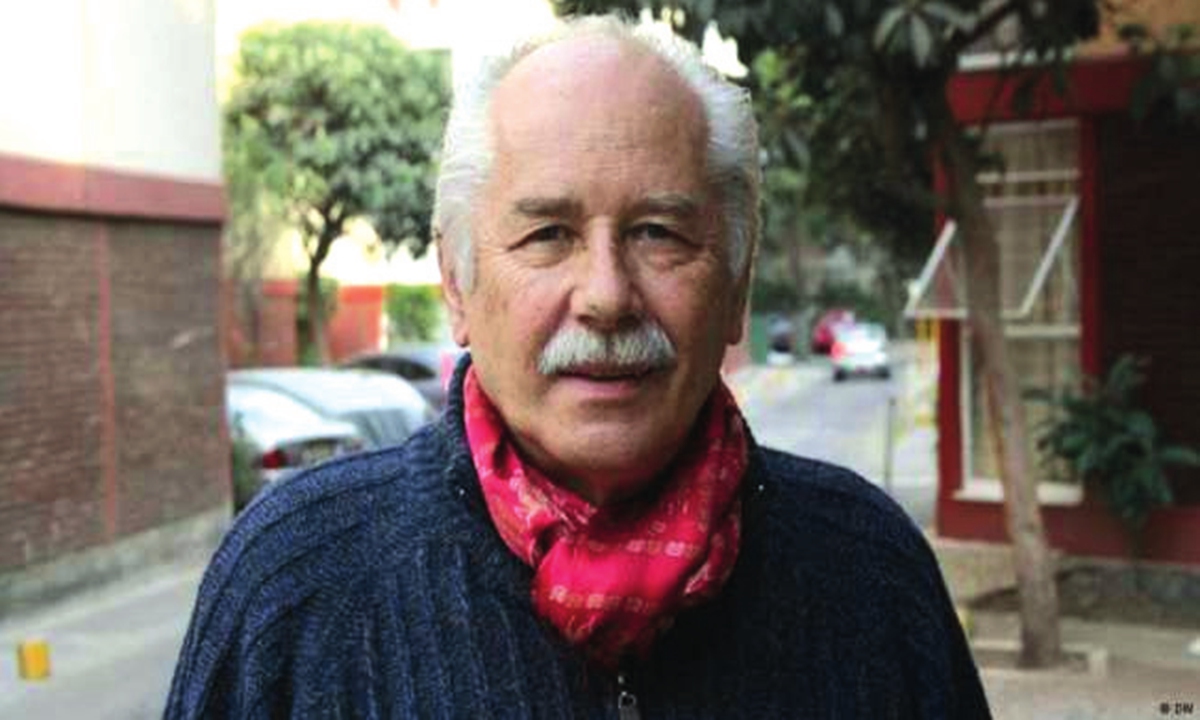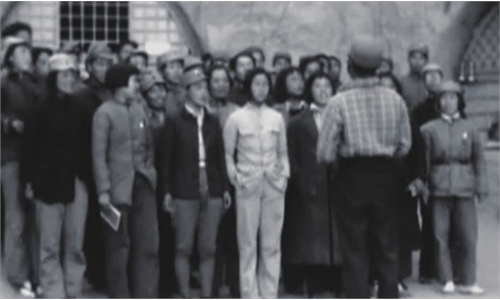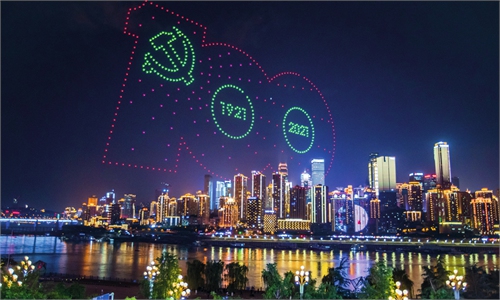
Illustration: Liu Rui/GT
Editor's Note:
Western media outlets are nowadays overwhelmed by bias and lies about China and the Communist Party of China (CPC). But Heinz Dieterich (Dieterich), a world renowned sociologist and political analyst from Germany who first proposed the concept of "21st century socialism," believes the CPC is a vanguard that has been genuinely responding to the needs of the Chinese people and safeguarding their interests. What is the difference between the CPC and other political parties? Why do Western societies hold strong resistance toward the concept of socialism and communism? Dieterich shared his insights with Global Times (GT) reporters Bai Yunyi and Li Aixin in a virtual interview.
GT: How would you comment on the role and development of the CPC over the past 100 years? From a global perspective, what impact do you think the CPC has had on the world over the past century?
Dieterich: It seems evident to me that throughout its 100-year history, the CPC has served as a bulwark and antidote against the imposition of unilateral imperialist systems on humanity.
Following the Japanese invasion of Manchuria [Northeast China] in 1931, the Chinese people's war of resistance against the Japanese occupation played an important role in the global resistance and weakening against fascism. In 1949, with the triumph of the CPC in the Chinese civil war, Mao Zedong's famous declaration that "the Chinese people have stood up," according to my understanding, formally announced Communist China's presence on the world stage.
Its decisive participation in the Korean War (the war to resist US aggression and aid Korea) and the Vietnam War (Resistance War against America) helped frustrate US' attempt to dominate Asia. A few years later, in 1971, China became a veto-right member of the UN Security Council, that further incremented its global function.
If you turn to a different aspect, the CPC-led "economic miracle" converted China into one of the four most important global players. Its GDP, in terms of people's purchase power calculation, will contribute about 27 percent of economic growth to the global economy in 2021, according to projections from the IMF.
From a military aspect, China does not yet have strategic military power that Russia and the US have. But it is getting there. And no doubt, it is the only important global cultural and political alternative to the West's capitalist civilization. So China, through the 100 years of the existence of the Communist Party of China, has become an increasingly important alternative construction role for a world future system very different to the Western capitalist power bloc.
GT: There are new challenges that China has to face when it comes to national development. What do you expect from CPC's future governance?
Dieterich: China is very successful with the development of the productive forces. It has been very successful with overcoming poverty and many other problems. But I think there's one asset that China has as a socialist country, which the capitalist countries do not have, which would be fundamental for the future of China. Nikita Khrushchev once said, the Russian citizen will have more beef on the table than the US citizen, and that is a measure of success and superiority of socialism over capitalism. That was a mistake, because that is a technocratic point of view.
If the US capitalist have $10,000 per capita, and you make it to $12,000, then your system is better? What is the principal weakness of the capitalist system? The principal weakness is that they cannot give their citizens a sense of life. The human being needs good material conditions. Therefore, you need to develop the productive forces. That is correct. But what is the end to communism? To create a society which has no social classes, where everybody has this living conditions, where there is no exploitation of the workers, no exploitation and repression of women, no destruction of nature and no discrimination against ethnically different people, ethnic minorities.
Capitalist systems cannot provide their citizens with such a sense of life and transcendence, because it is limited to vulgar materialist market enrichment and consumption and infantile religious indoctrination-schemes.
The development of the productive forces is important and necessary, but the real historic mission of socialism is the abolition of exploitation, repression and ecological destruction. That is the real superiority of socialism over bourgeois capitalist societies.

Photo: Heinz Dieterich
GT: Take the Communist Party of the Soviet Union (CPSU) as a talking point. What do you think is different about the CPC compared with other countries with political parties that are also labeled as "one-party rule"?Dieterich: The principal difference with the CPSU is the understanding of differences in development from one transition phase in history to another one, and the capability to control and guide these transitions. For example, the Soviet Union had a war-communist development model, which was basically structured by Joseph Stalin after the death of Vladimir Lenin. After Stalin's death in 1953, Khrushchev the new chairman and the party did not have the capacity to redirect Stalin's government model toward a new path of communist development, which the new technology and new global order required. The Russian party did not have the capacity to transit from the war-communist model to 21 century socialist model as in China.
After the death of Mao Zedong, you had somebody with a strategic vision and the capacity of the party to reorient the historic development path toward reform and opening-up. I am talking, of course, about Deng Xiaoping, who was able to understand that structural reforms were necessary in the historic mission of building socialism. That's the difference. That is why the system in China did not collapse as it did in the Soviet Union.
GT: What do you think are CPC's major differences compared with Western political parties such as those in the US?
Dieterich: The main difference between the two political systems is that China is ruled by a vanguard, while the US is ruled by elites, by private capitalist corporations, which outsource the task of political government to professional executive agencies which they called "political parties." The US political system has never been real democracy. As the famous Columbia University sociologist C. Wright Mills documented in his 1956 study "The Power Elite," the US political system is a plutocratic-oligarchic system. That has not changed in the last 60 years. A finding reconfirmed it recently by Princeton University professor Martin Gilens and Northwestern University professor Benjamin I Page - the US is an oligarchy system, as it was defined in classic Greek history, and not a democracy. It's a system of elites, not of vanguard as in China.
The US system's dynamics in all respects are determined by the particular profit and accumulation interests of four dominant groups of Corporate America: financial capital (Wall Street), the military-industrial complex, the high-tech information tycoons (Mark Zuckerberg, Jeff Bezos, Bill Gates and so on), the media (including CNN and Fox ) and, in general, what Mills called the Power Elites. That is the major difference on a profound level off scientific understanding of the US political system and China's political system.
GT: We have heard quite a few Western politicians and forces describe the CPC-led China as a country of so-called one-party dictatorship; they also stress that a democracy must have a Western electoral system. What's your take on this viewpoint?
Dieterich: The concept of dictatorship makes sense only if you apply it to the relationship between a government and the people's needs. Only when you measure if a government responds to the people's needs in all aspects, you can talk about democracy or the dictatorship.
A dictatorship exists when the people's needs are not taken into account by the power elites. That is the case in many countries today, which have formal multiparty bourgeois democracies, but not the case in China.
China is not dictated, and is not governed by an elite dictatorship. Take the US for example.
Chinese government is essentially a national vanguard. The difference between a vanguard and elites is, vanguard responds to the needs of the people and elites, on the contrary, put forward first and foremost their own particular interests.
China is not a one-party dictatorship, because it advances the material well-being of the people. In addition, it step by step advances the rule of law and the civilian rights of its citizens. That's why the CPC has the overwhelming support of the great majority of the Chinese citizens. And the support of the majorities for a government gives the system the status of being democratic in a real sense, not in a formal sense, because democracy is the rule of the majority.
The real dictatorship is in the Western democracies like the US, which cannot solve any problem: the gun problem, the racial discrimination, the unaffordable military complex, military spending and so on. They're incapable of solving any real problem that is absolutely different from the CPC today.
What defines a vanguard? There are two or three elements. First of all, it must have a scientific understanding of reality. Science is the only software that gives you an objective understanding of the facts of reality. And therefore permits you to plan for a better situation of the country and of the people. Without science, you cannot be vanguard, but science must be ethical. It must be moral. It must use this incredible, powerful instrument, which is scientific research, for the people. You must not create new weapons for the military industrial complex. But you must create new vaccines, new transport systems, new public systems.
You can have over a dozen political parties in the country and you have no democracy. The number of political parties tells you nothing about real material democracy. It's an indicator which has no interpretive value for objective effects in reality.
GT: Some Western politicians tend to separate the CPC from Chinese people, clamoring that the two are on the opposite sides. They say they stand with the Chinese people, but are against the CPC. What do you think might be the motivation behind such rhetoric?
Dieterich: This is fake news, lies. The power of a government, apart from science, is within the support of the people. If a government has a solid relationship with and support from the masses, nobody can destroy the government and its projects. If you want to destroy an existing government, you have to try to cut this relationship of interaction, support and understanding between the vanguard and the masses. That is the function of this color revolution attempt against China. Nothing of this is new.
Take, for example, the distraction of the Soviet Union, the ideological destruction of Soviet Russia was the major interest of US imperialism since they could not go to nuclear war against the Soviet Union. As the Soviet Union had nuclear weapons, it could not be attacked. So you need to destroy its soft power, diplomacy with lies, propaganda and so on.
That became the official foreign policy doctrine of the US after 1947, when George Kennan, a US ambassador in Moscow, wrote the famous long telegram, which was in 1947 published in the influential establishment journal, Foreign Affairs, under the name "The sources of Soviet conduct." Kennan argues that the only way to destroy the Soviet Union is to divide the people from the government.
This strategy is retaken under Donald Trump. And it was developed by a neofascist advisor of Trump, Stephen Bannon. Bannon was the principal ideologue of Trump's aggressive ideology against China. They used the same lie Kennan used in 1947. He said, we are friends of the Chinese people, we are friends of the Chinese workers, but we are enemies of the CPC, which is a dictatorship against their own people. So the US wants to liberate the people from this government. So there's nothing new in this propaganda lie.
The people have seen the betterment in their life. The living standard is grown exponentially. Even in an international comparison. For example, in the 1950s, the per capita income in China, India, and Indonesia, were essentially the same. Today, the per capita income of China's citizens is about $11,000. In Indonesia, it's about $4,000. In India, it's about $1,180. That shows you the difference that has been made in China under the leadership of the CPC and these 70 years from the 1950s.
People understand it. People have seen how their situation has become much better year by year. So people respond to that. And that's why it is ridiculous to think that the Chinese citizens do not understand that the best guarantor, the best protagonist of their objective interest, is the CPC. These are the facts.
GT: Is that where Western people's misunderstanding of the CPC comes from?
Dieterich: It is not a problem of misunderstanding. Misunderstanding means that there is a communications problem, a semantic problem, or a semiotic problem. You do not interpret reality adequately. But that is not the problem we have in front of us. The Western societies do not misunderstand what the CPC is or what it wants to do. They are submitted to the so-called perception management program. That means that the way they perceive reality has to be controlled by the ruling elites.
That was put forward in the 1940s by American sociologists. They said that in a dictatorship, it's very easy to control the mind of the people, because you threaten them. But how do you control them in a democracy which formally gives them right to read, to think and so on? They came up with the solution. The solution is television, because television channels are open doors to the public mind. That was a basic program. That has been much more sophisticated in the past years. The perception of the people has to be controlled and determined by the leaders. They are not democratic. They are not ethical. They're criminals to a certain extent. The Western society is not misunderstanding the CPC or what communist means. They are brainwashed by their cultural and political domination programs.
Their status of political conscience is that of Pavlov's dogs, that is, determined by "conditioned reflexes." So, there is no misunderstanding at all. The Western societal views on the CPC are the direct outcome of the almost perfect indoctrination and propaganda machine of an imperialist system that cannot exist without an external enemy. It is not a pedagogic or a cognitive problem, but a conflict of antagonistic social and human value-systems.
Khrushchev said there can be peaceful coexistence with imperialism, and then we will show, he said, that communism is much better. Let's be friends, and each system shows which is better. That is a fundamental misunderstanding of how biological systems and entities like human beings or animals work. They never understood children's stories. If you have two competing biological system, take lions and hyenas, or two states, Soviet Union and US imperialism, it is a fight for scarce resources, it is a fight to the end.
Take Trump and Biden. They do not accept competition (with China). Trump wanted to destroy China first, and then Russia. Biden has the same objective, but the sequence is different. He wants to destroy Russia first - that's why the US is preparing a war in Ukraine - and then destroy China. So there is no misunderstanding of Western society, but a conscious program of mind control and conduct control of the citizens.
GT: You have interacted with left-wing parties in quite a few countries. Has the CPC left you any impression that distinguishes the party from others? And why are some left-wing Western politicians also tending to attack China?
Dieterich: Many social democratic parties are being called left. But they are not socialist communist parties. They do not want a communist system like that in China. They want only a more humane capitalist system. They are not really leftist, they are part of the capitalist system. They are therefore, enemies of a communist proposal. And that is the reason why they try to subvert China.
Democratic socialism is not socialism. It's a social democratic vision. US Senator Bernie Sanders always criticizes the billionaire class. But he never called for the state control of the political economy.
Sanders would have had to say the corporations which dominate the US policy have to be under control, private ownership of the tycoon corporation must be substituted by state. Why did he never say that? Because then he would not have any money for his political campaigns from these corporations, because the presidents are the ones who get more money from the four power groups, which I mentioned earlier. If you do not accept that they are untouchable, you can never become a president. You can never change the system. And Sanders knows that. He is not a revolutionary. He will never accept that you have a system in which people come first and the corporations come second.
That's the same with the German social democrats, with the Green Party, with the French Socialist Party and so on. They all have these fancy names. They are all part of the system. And they live by the system and they live well so they do not revolt against the system.
The system defines China is the external enemy that has to be destroyed. They follow. For example, the Green Party supports the US economic extortion of the North Stream 2 pipeline from Russia to Germany, and supports US imperialist aggression against the German interest and the alliance with Russia. Why? Because they know the real power is the US. If they want to become the dominant part in Germany, they will need the support from the White House. There's much discourse from supposedly leftist transformations they are going to make. That is all propaganda. There's nothing real in it.
GT: It seems that Western societies are still holding strong resistance toward the concepts of socialism and communism. Are there any historical and social causes for Westerners to be so resistant or vigilant against these concepts of governance?
Dieterich: Imperialist states and powers always need external threats to justify their undemocratic practices. Their external enemy, first of all, is China, because it's the real coming superpower. And secondly, Russia. And if there are no credible external threats to their governments, then they have to invent them. That's the real fake news of the Western propaganda system, not only the mainstream and also the social networks, which eventually reflect what mainstream media produce.
The causes for this anti-communism and the discrimination of China are the needs of their corporate owners. That will not end.
The so-called social scientists in the West are nothing more than paid propagandists of the ruling elites. They pay to maintain the people in the state of confusion and chaos. There is no objective truth. Trump was the main promoter of this. And if there's no objective truth, you cannot take a position on the most pressing problems of society. They confuse people, the people don't know where to go, because they don't know what is right and what is wrong, and where to turn to, unless the Alpha animals, the leaders, tell them where to go.
It's all part of a mental political control system, which needs a credible threat. That credible threat is China for now and for the times coming, then everybody plays along. They have the citizens brainwashed.
That is why more than 70 million people support a liar like Trump. Even after the attacks in the Capitol Hill, they continued supporting him. It means they are immune to lies, and that did not respect women, he did not respect third world people. So on and so on.


